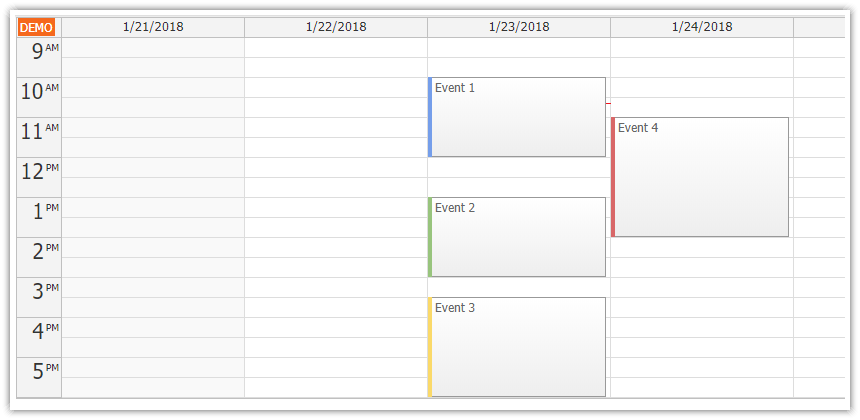Features
Boilerplate project with all required dependencies
Angular 5
Generated using Angular CLI
Uses Angular 5 monthly calendar component from DayPilot Pro for JavaScript
Includes a trial version of DayPilot Pro for JavaScript (see License below)
Standalone module with all code related to the monthly calendar
License
Licensed for testing and evaluation purposes. Please see the license agreement included in the sample project. You can use the source code of the tutorial if you are a licensed user of DayPilot Pro for JavaScript.
Angular 5 Monthly Calendar Component
The customized monthly calendar component is defined in month.component.ts TypeScript file as MonthComponent.
The component HTML template contains DayPilot Month component tag (<daypilot-month>):
@Component({
template: `<daypilot-month [config]="config" [events]="events" #month></daypilot-month>`,
// ...
})The [config] attribute points to a config object that holds the monthly calendar properties and event handlers:
export class MonthComponent implements AfterViewInit {
// ...
config: any = {
startDate: "2017-12-01"
};
}The [events] attribute defines the data source object:
export class MonthComponent implements AfterViewInit {
events: any[] = [];
// ...
}The monthly calendar will automatically watch changes made to the "events" property and update the calendar UI if necessary.
Full source code of month.component.ts:
import {Component, ViewChild, AfterViewInit} from "@angular/core";
import {DayPilotMonthComponent} from "daypilot-pro-angular";
import {DataService} from "./data.service";{}
@Component({
selector: 'month-component',
template: `<daypilot-month [config]="config" [events]="events" #month></daypilot-month>`,
styles: [``]
})
export class MonthComponent implements AfterViewInit {
@ViewChild("month")
month: DayPilotMonthComponent;
events: any[] = [];
config: any = {
startDate: "2017-12-01"
};
constructor(private ds: DataService) {
}
ngAfterViewInit(): void {
var from = this.month.control.visibleStart();
var to = this.month.control.visibleEnd();
this.ds.getEvents(from, to).subscribe(result => {
this.events = result;
});
}
}
Angular 5 Data Service
The data access service provides a getEvents() method that returns the event data. This sample project uses a statically-defined array but you can easily replace it with a server-side AJAX call.
data.service.ts
import {Injectable} from "@angular/core";
import {Observable} from "rxjs/Observable";
import {DayPilot} from "daypilot-pro-angular";
import {HttpClient} from "@angular/common/http";
@Injectable()
export class DataService {
events: any[] = [
{
id: "1",
start: "2017-12-04",
end: "2017-12-05",
text: "Event 1",
backColor: "#ea9999"
},
{
id: "2",
start: "2017-12-05",
end: "2017-12-08",
text: "Event 2",
backColor: "#a2c4c9"
},
{
id: "3",
start: "2017-12-11",
end: "2017-12-11",
text: "Event 3",
backColor: "#b6d7a8"
},
{
id: "4",
start: "2017-12-11",
end: "2017-12-11",
text: "Event 4",
backColor: "#ffe599"
}
];
constructor(private http : HttpClient){
}
getEvents(from: DayPilot.Date, to: DayPilot.Date): Observable<any[]> {
// simulating an HTTP request
return new Observable(observer => {
setTimeout(() => {
observer.next(this.events);
}, 200);
});
// return this.http.get("/api/events?from=" + from.toString() + "&to=" + to.toString());
}
}
 DayPilot
DayPilot





